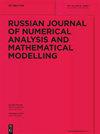SLAV数值天气预报模型中的冰川参数化
IF 0.6
4区 数学
Q4 MATHEMATICS, APPLIED
Russian Journal of Numerical Analysis and Mathematical Modelling
Pub Date : 2022-08-01
DOI:10.1515/rnam-2022-0016
引用次数: 0
摘要
摘要在本文中,我们描述了一种用于数值天气预测模型的一维冰川参数化。该方案已应用于全球大气模式SLAV中。为了避免对流层低层表面温度和湍流热通量的不一致性,冰川参数化与行星边界层和陆地表面方案反复耦合。SLAV模型的首次数值实验结果表明,引入冰川热容的简化描述可以显著提高2米温度的长期天气预报技能。本文章由计算机程序翻译,如有差异,请以英文原文为准。
Glacier parameterization in SLAV numerical weather prediction model
Abstract In the present paper, we describe a one-dimensional glacier parameterization for use in the numerical weather prediction models. The proposed scheme is implemented into the global atmospheric model SLAV. To avoid inconsistency of surface temperature and turbulent heat fluxes in the lower troposphere, glacier parameterization has been iteratively coupled with both planetary boundary layer and land surface schemes. First results from numerical experiments with the SLAV model show that the introduction of a simplified description of the glacier heat capacity can significantly improve the 2-meter temperature long-range weather forecast skill.
求助全文
通过发布文献求助,成功后即可免费获取论文全文。
去求助
来源期刊
CiteScore
1.40
自引率
16.70%
发文量
31
审稿时长
>12 weeks
期刊介绍:
The Russian Journal of Numerical Analysis and Mathematical Modelling, published bimonthly, provides English translations of selected new original Russian papers on the theoretical aspects of numerical analysis and the application of mathematical methods to simulation and modelling. The editorial board, consisting of the most prominent Russian scientists in numerical analysis and mathematical modelling, selects papers on the basis of their high scientific standard, innovative approach and topical interest.
Topics:
-numerical analysis-
numerical linear algebra-
finite element methods for PDEs-
iterative methods-
Monte-Carlo methods-
mathematical modelling and numerical simulation in geophysical hydrodynamics, immunology and medicine, fluid mechanics and electrodynamics, geosciences.

 求助内容:
求助内容: 应助结果提醒方式:
应助结果提醒方式:


